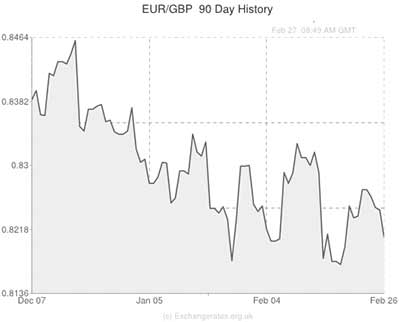
While the Euro began European trading weaker against the Pound, positive Eurozone data could help the common currency recoup losses against its British counterpart.
The Euro was modestly boosted as German unemployment fell by more than forecast and a measure of economic confidence for the Eurozone rose unexpectedly.
A report published in the early hours showed that Germany’s unemployment rate held at 6.8 per cent in February, with the number of German jobless falling by 14,000 instead of dipping by the 10,000 forecast.
This result marks a third month of falling unemployment in the Eurozone’s largest economy and prompted this response from income strategist Annalisa Piazza; ‘The German labour market remains robust and it benefits from the recent pickup in activity. The labour market is set to remain a supportive factor for consumption even if employment growth doesn’t accelerate considerably near term’.
Later separate figures revealed that the Eurozone’s consumer confidence index fell from -11.7 in January to -12.7 in February, as expected by economists, while a gauge of economic confidence climbed from a positively revised 101.0 to 101.2. Economists had projected a reading of 100.7 for February.
The better-than-forecast result was largely due to improvement in the currency bloc’s services industry.
Meanwhile, the Eurozone business climate indicator advanced from 0.25 to 0.37 and industrial confidence in the 18-nation currency bloc eased up from -3.8 to -3.4 this month.
Finally, Eurozone services confidence came in at 3.2 following a positively revised figure of 2.4 in January.
Modest Euro gains followed the release of these reports.
The upbeat data may ease pressure on the European Central Bank and help persuade it not to introduce additional easing measures when it meets next week.
Euro gains against the Pound were aided by the news that the Lloyds business barometer for the UK fell from 63 in January to 53 in February.
However, while the Eurozone’s economic outlook was brightened by this morning’s news Euro gains were limited ahead of the release of today’s German inflation data, scheduled for publication at 13.00 GMT.
As inflation concerns are one of the biggest downside risks to the Eurozone’s recovery, the report will be of particular interest.
However, even if the figures pleasantly surprise, the Euro to Pound exchange rate may be restrained ahead of next week’s ECB meeting.
That being said, EUR/GBP volatility may occur tomorrow following the release of the UK consumer confidence survey, German retail sales figures and Eurozone inflation data.
Euro Exchange Rates
[table width=”100%” colwidth=”50|50|50|50|50″ colalign=”left|left|left|left|left”]
Currency, ,Currency,Rate ,
Euro, ,Pound Sterling,0.8204,
,Pound Sterling,0.8204,
Euro, ,US Dollar,1.3647,
,US Dollar,1.3647,
Euro, ,Canadian Dollar,1.5190,
,Canadian Dollar,1.5190,
Euro, ,Australian Dollar,1.5316,
,Australian Dollar,1.5316,
Euro, ,New Zealand Dollar,1.6392 ,
,New Zealand Dollar,1.6392 ,
US Dollar, ,Euro ,0.7325,
,Euro ,0.7325,
Pound Sterling, ,Euro,1.2182,
,Euro,1.2182,
Canadian Dollar, ,Euro,0.6585,
,Euro,0.6585,
Australian Dollar, ,Euro,0.6538
,Euro,0.6538
New Zealand Dollar, ,Euro,0.6082 ,
,Euro,0.6082 ,
[/table]

Comments are closed.